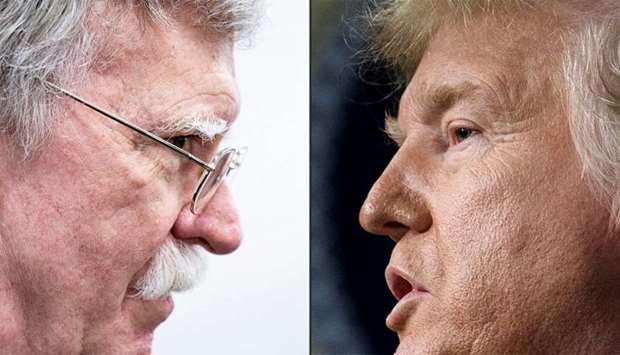Donald Trump's presidency was in turmoil on Thursday after top ex-aide John Bolton declared him unfit for office, raising the stakes on a controversial re-election rally meant to boost his flailing campaign.
Trump's once supremely self-confident march towards a second term was already in a hole due to criticism over his responses to the coronavirus pandemic and nationwide anti-racism protests.
He took another body blow on Thursday when the Supreme Court ruled against his administration's bid to remove protections for hundreds of thousands of undocumented migrants classified as "Dreamers."
In an extraordinary outburst on Twitter, Trump called decisions by the top court "shotgun blasts into the face of people that are proud to call themselves Republicans."
Now, the outsider president who had never even contested an election before his shock win in 2016, also faces a blistering insider attack from his former national security aide.
"I don't think he's fit for office. I don't think he has the competence to carry out the job," Bolton told ABC News to promote his book, The Room Where it Happened.
The book - which the White House is trying desperately to get stopped by court order - alleges that Trump asked Chinese President Xi Jinping for re-election help, obstructed justice, and was no match for Russian President Vladimir Putin.
"Putin thinks he can play him like a fiddle," Bolton told ABC.
Trump, who has assiduously built his image as a president who is tough on China, lashed back at Bolton, calling him a "sick puppy" and dismissing the book as "fiction."
But for all the scandals and even impeachment that Trump has weathered, the book inflicts a newly painful kind of wound.
A lifelong Republican and foreign policy hawk, Bolton is arguably well to the right of Trump and therefore not vulnerable to Trump's usual attacks.
Trump largely brushed off responsibility for the rapid spread of the coronavirus, which has killed more than 117,000 Americans and forced a traumatic economic slowdown, calling it "the invisible enemy" and blaming it on Beijing.
In a Wall Street Journal interview, he teased that the Chinese might even have deliberately allowed the virus to spread because the US was "killing" them economically - but then said he doubted this would have happened.
Facing a wave of street anger over police brutality, Trump has also largely rejected rising public sentiment that the root problem is racism, instead labelling demonstrators radical leftists and anarchists.
Saturday, Trump will fly to Tulsa, Oklahoma, to hold his first campaign rally since the coronavirus halted travel and big gatherings in March.
With his TV show background and natural populist flair, Trump is far happier in front of cheering crowds than in the formal settings of the White House.
Trump is "very excited to get back on the road," his adviser Kellyanne Conway told reporters.
So he'll be hoping that the razzmatazz and the energy of the 20,000 strong crowd will jumpstart his re-election, which polls show him currently losing heavily to Democrat Joe Biden.
Even as Americans only slowly ease out of lockdown, several other rallies are already being planned.
But Trump is also going to have to hope that he doesn't go down in history as the president who put political rallies ahead of people's lives.
Tulsa is seeing a local spike in coronavirus cases and the city's main newspaper, the state health chief and many others have warned that the huge crowd in an enclosed space could become a viral incubator.
A lawsuit filed in a Tulsa court to try to stop the rally called it a virus "superspreader."
The Trump campaign says it will take temperatures and distribute masks.
Tellingly, though, it is also requiring anyone attending to sign a waiver, making them unable to hold the organisers responsible for getting sick.
His Tulsa rally suffered a further setback when it was scheduled originally for Friday, which is the June 19th or "Juneteenth" anniversary of the end of slavery in the United States.
Amid soaring racial tensions and anger from civil rights groups at his handling of the police violence protests, that struck the wrong tone and Trump was forced to shift to Saturday.
"Nobody had ever heard of it," he claimed in the Wall Street Journal interview. "I did something good: I made Juneteenth very famous."
In fact, the White House annually puts out a statement commemorating the occasion, which is also marked by nearly all US states.

